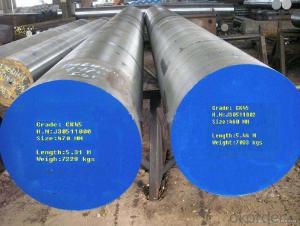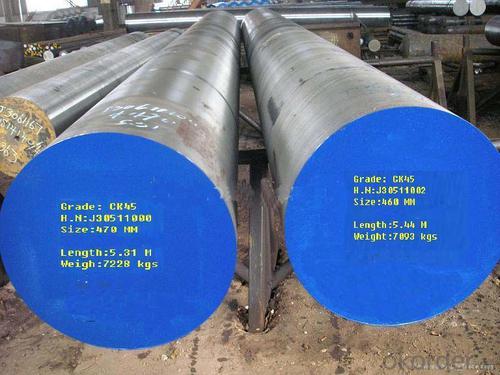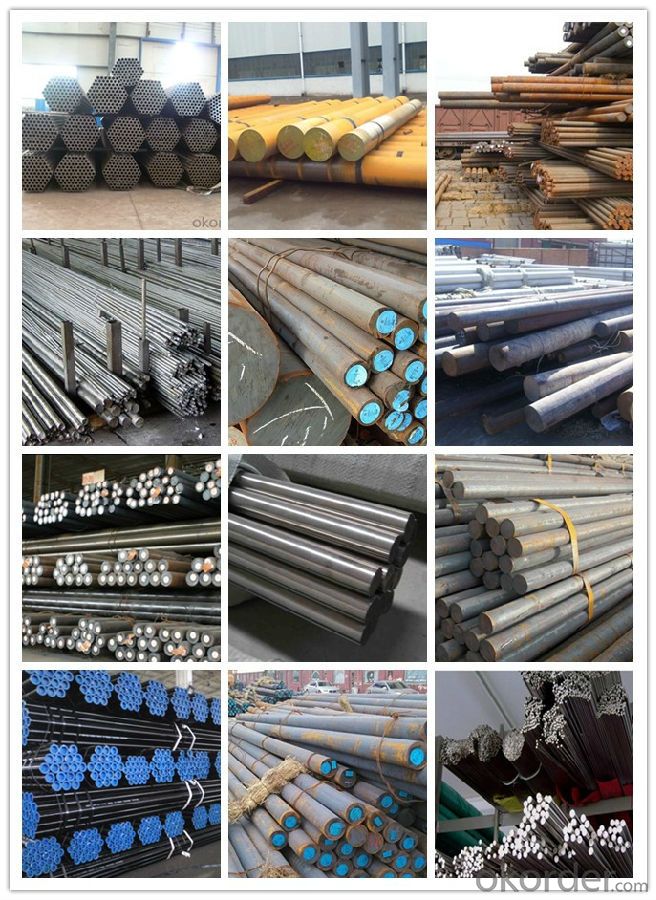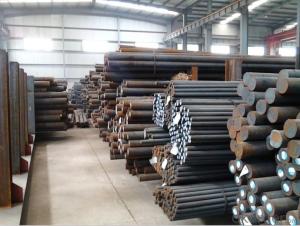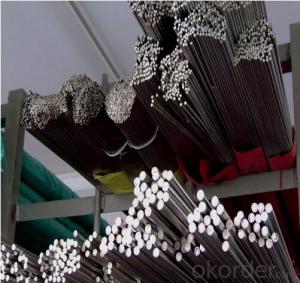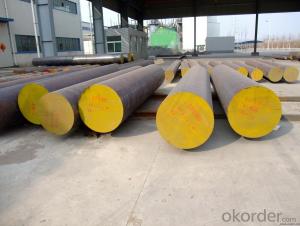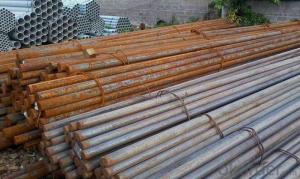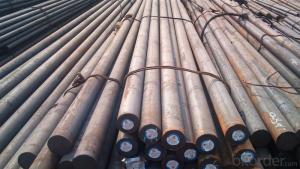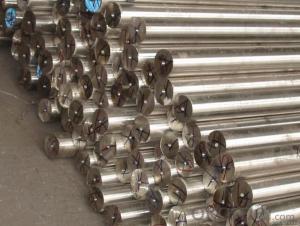Special Steel SKD12 Round Forged Tool Steel
- Loading Port:
- China main port
- Payment Terms:
- TT OR LC
- Min Order Qty:
- 30 m.t.
- Supply Capability:
- 10000 m.t./month
OKorder Service Pledge
OKorder Financial Service
You Might Also Like
Specification
Specifications
SKD12 Flats
1.Dimension:10~620mmX50~1200mm
2.Delivery Conditon:annealed, black/milled surface
3.Short Delivery Time
Product information
Chemical Composition(%) | ||||||||
C | Si | Mn | P | S | Cr | Mo | V | |
0.95-1.02 | 0.10-0.40 | 0.40-0.80 | ≤0.030 | ≤0.030 | 4.80-5.50 | 0.90-1.20 | 0.15-0.35 | |
Use | ||||||||
1. corrosion resistance | ||||||||
2. wear resistance of high quality plastic mould | ||||||||
3. transparent plastic mould. | ||||||||
Heat Treatment | ||||||||
annealed, 229HBS max(optional)/after Q+T, hardness 28-32HRC(optional) | ||||||||
Melting Process | ||||||||
1. EAF: Electric Furnace+LF+VD(Optional) | ||||||||
2. ESR: Electric Furnace+LF+VD+Eleroslag Remelted(Optional) | ||||||||
UT Class | ||||||||
According to Standard of SEP 1921/84,100% Volume, Level C/c, D/d or E/e | ||||||||
Tolerance on Quantity | ||||||||
+/-10% Per Size Documents 1. Packing List 2. Invoice 3. CO. 4. Bill of Loading 5. Shipping Advice 6. Mill Test Certificate 7. The other files as you requested | ||||||||
Product show
Workshop show
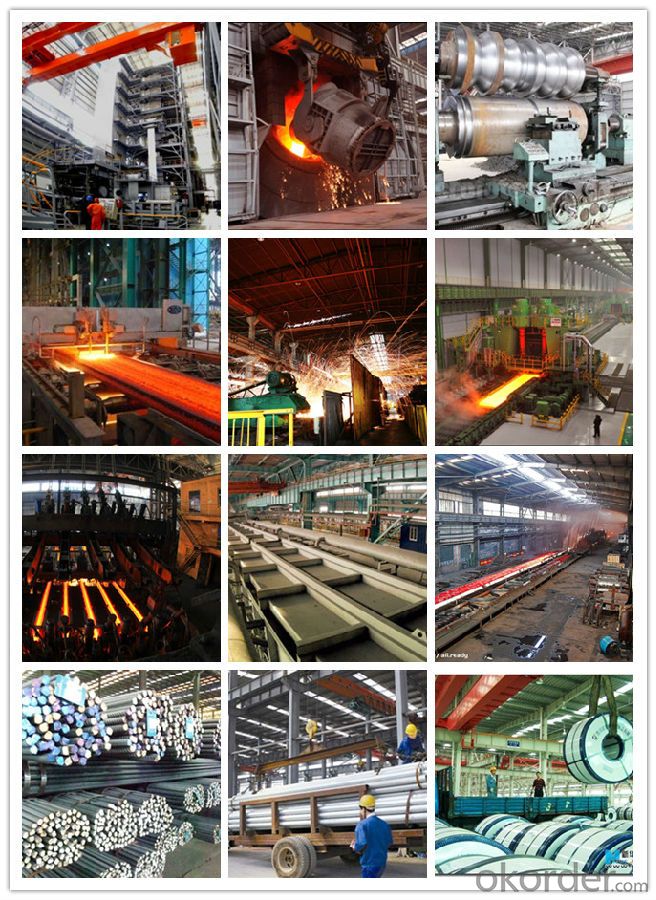
Shipping
1. FedEx/DHL/UPS/TNT for samples, Door-to-Door;
2. By Air or by Sea for batch goods, for FCL; Airport/ Port receiving;
3. Customers specifying freight forwarders or negotiable shipping methods!
Delivery Time: 3-7 days for samples; 5-25 days for batch goods.
Payment Terms
1.Payment: T/T, L/C, Western Union, MoneyGram,PayPal; 30% deposits; 70% balance before delivery.
2.MOQ: 1pcs
3.Warranty : 3 years
4.Package Informations: 1) EXPORT, In 20 feet (GW 25 ton) or 40 feet Container (GW 25 ton)
2)as customer's requirement
Why choose us?
(1) The leading exporter in China special steel industry.
(2) Large stocks for various sizes, fast delivery date.
(3) Good business relationship with China famous factories.
(4) More than 7 years steel exporting experience.
(5) Good after-sales service guarantee.
- Q: What are the requirements for special steel used in renewable energy equipment manufacturing?
- The requirements for special steel used in renewable energy equipment manufacturing include high strength and durability, corrosion resistance, and the ability to withstand extreme temperatures and environmental conditions. Additionally, the steel should possess good weldability and formability to facilitate the manufacturing process. It is also important for the steel to have low carbon content to reduce its environmental impact and improve sustainability.
- Q: What are the different types of alloy steel?
- There are several different types of alloy steel, including stainless steel, tool steel, maraging steel, high-strength low-alloy steel (HSLA), and nickel-based alloy steel.
- Q: How does special steel contribute to the creep resistance of products?
- Special steel contributes to the creep resistance of products by offering enhanced mechanical properties, such as high tensile strength and toughness, which help to resist deformation and damage over time. Additionally, the unique alloying elements and heat treatment processes used in special steel production further improve its resistance to creep, which is the gradual deformation occurring under prolonged exposure to high temperatures and constant stress. This makes special steel a reliable choice for applications where long-term structural integrity and durability are crucial, such as in high-temperature environments or load-bearing components.
- Q: What are the different methods for improving the impact resistance of special steel?
- Special steel can be made more impact resistant through various methods. These methods fall into three main categories: heat treatment, alloying, and surface treatments. Heat treatment is a commonly used method to improve impact resistance. It involves carefully heating and cooling the steel to change its microstructure. Tempering and quenching are the two primary heat treatment processes used for this purpose. Tempering involves heating the steel to a specific temperature and then slowly cooling it. This helps to relieve internal stresses and increase toughness. On the other hand, quenching involves rapidly cooling the steel after heating it to a high temperature. This results in a hardened microstructure, which enhances impact resistance. Alloying is another method to enhance the impact resistance of special steel. By adding specific elements to the base steel, its properties can be improved. For instance, elements like manganese, nickel, or chromium can be added to increase toughness and impact resistance. These alloying elements modify the steel's microstructure, resulting in enhanced strength and resistance to deformation. Surface treatments are used to provide a protective layer on the steel's surface, thereby improving impact resistance. A commonly employed surface treatment is case hardening, which introduces carbon or nitrogen into the outer layer of the steel. This creates a hard surface while maintaining a tough core, resulting in improved impact resistance. Another surface treatment method is shot peening, where the steel surface is bombarded with small particles under high pressure. This induces compressive stresses in the surface layer, enhancing fatigue and impact resistance. In summary, the impact resistance of special steel can be improved through different methods, including heat treatment, alloying, and surface treatments. These methods can be applied individually or in combination to enhance the steel's mechanical properties, making it more resistant to impact and deformation.
- Q: What are the different methods of surface pickling for special steel?
- Pickling special steel can be achieved through various methods. These methods comprise acid pickling, electrolytic pickling, mechanical pickling, and passivation. The most commonly employed method for pickling special steel is acid pickling. It entails immersing the steel in an acid solution, typically hydrochloric acid or sulfuric acid, to eliminate any surface impurities. By reacting with the steel's oxide layer, the acid dissolves it, leaving a pristine surface. Electrolytic pickling, on the other hand, involves passing an electric current through the steel submerged in an electrolyte solution. This creates a chemical reaction that removes surface impurities. Electrolytic pickling offers better control and enables a more consistent surface finish compared to acid pickling. Mechanical pickling utilizes abrasive materials like sandpaper or wire brushes to physically scrub the steel's surface and eliminate any scale or rust. It is often combined with acid or electrolytic pickling to achieve the desired surface finish. After pickling, special steel can undergo passivation to enhance its corrosion resistance. Passivation entails treating the steel with a chemical solution, typically nitric acid or citric acid, to form a protective oxide layer on the surface. This layer prevents further corrosion and enhances the steel's overall durability. It's worth mentioning that the specific method of surface pickling for special steel may vary depending on factors such as the type of steel, desired surface finish, and intended application. Therefore, it is essential to consult experts or adhere to the manufacturer's guidelines to ensure the appropriate pickling method is employed for special steel.
- Q: How does special steel perform in terms of wear resistance?
- Special steel performs exceptionally well in terms of wear resistance. It is specifically engineered to withstand abrasive forces, making it highly durable and long-lasting even in demanding environments. The unique composition and heat treatment processes used in its production enhance its hardness, toughness, and ability to resist wear, ensuring that it can withstand friction, impact, and other forms of wear and tear with minimal degradation.
- Q: How does special steel contribute to the aerospace material cost reduction?
- Special steel contributes to the aerospace material cost reduction by offering enhanced properties such as high strength, lightweight, and corrosion resistance. These qualities allow for the use of thinner and lighter steel components, reducing the overall weight of the aircraft. This, in turn, leads to lower fuel consumption, maintenance costs, and increased payload capacity. Furthermore, the durability and long lifespan of special steel reduce the need for frequent replacements, resulting in cost savings for the aerospace industry.
- Q: How does special steel perform in cryogenic conditions?
- Special steel performs well in cryogenic conditions due to its low ductile-brittle transition temperature, high strength, and good toughness. It maintains its mechanical properties and resists cracking or fracture at extremely low temperatures, making it suitable for various applications such as liquefied natural gas (LNG) storage tanks, aerospace components, and cryogenic research equipment.
- Q: How does special steel perform in heat treatment applications?
- When it comes to heat treatment applications, special steel is specifically engineered to excel. Unlike regular steel, special steel is enriched with specific elements that enhance its heat resistance and improve its mechanical properties. Through processes like annealing, quenching, tempering, or hardening, special steel undergoes structural changes that result in increased strength, hardness, toughness, and wear resistance. The exceptional performance of special steel in heat treatment applications can be attributed to its unique alloying elements, including chromium, molybdenum, nickel, and vanadium. These elements create various carbides, nitrides, or intermetallic compounds during heat treatment, contributing to the overall enhancement of the steel's properties. For example, chromium forms chromium carbides, which boost hardness and corrosion resistance, while molybdenum and vanadium enhance hardenability and wear resistance. Furthermore, special steel exhibits remarkable dimensional stability during heat treatment. It possesses a low tendency to warp or distort, ensuring that the final product retains its desired shape and dimensions. This dimensional stability is especially crucial for applications that require precise tolerances or intricate designs. Moreover, special steel offers consistent and dependable heat treatment results. Its composition and microstructure are meticulously controlled, guaranteeing a predictable response to heat treatment processes. This enables manufacturers to consistently achieve the desired mechanical properties, minimizing the risk of inconsistencies or failures in the end product. In conclusion, special steel excels in heat treatment applications. Its exceptional alloying elements, dimensional stability, and reliable heat treatment response make it an ideal choice for applications that necessitate improved strength, hardness, toughness, and wear resistance. Whether it is for automotive components, tooling, or industrial machinery, special steel delivers dependable and enhanced performance after undergoing heat treatment processes.
- Q: How does special steel contribute to the manufacturing of springs for automotive applications?
- Special steel plays a crucial role in the manufacturing of springs for automotive applications due to its unique properties and characteristics. Springs are essential components in automobiles as they provide the necessary suspension and shock absorption, ensuring a smooth and comfortable ride. One of the key advantages of special steel in spring manufacturing is its high strength and durability. Springs are subject to constant stress and repetitive loading, and special steel, with its exceptional strength, can withstand these forces without deforming or breaking. This property ensures that the springs can function reliably and maintain their shape and performance over extended periods of use. Additionally, special steel offers excellent fatigue resistance, which is vital for springs in automotive applications. Fatigue occurs when a material weakens and eventually fails after repeated loading and unloading cycles. Special steel is specifically designed to withstand fatigue, allowing the springs to endure the constant pressure and stress without experiencing premature failure. Moreover, special steel provides superior corrosion resistance, which is particularly important for automotive springs. Cars are exposed to various environmental elements, including moisture, road salt, and chemicals, which can lead to corrosion and deterioration of the springs. By using special steel with enhanced corrosion resistance, manufacturers can ensure that the springs have a longer lifespan and maintain their performance even in harsh conditions. Furthermore, special steel offers versatility in terms of its composition and properties. Manufacturers can choose from a wide range of special steel alloys, each with its own unique characteristics, to meet specific requirements. For example, some alloys offer greater elasticity, allowing the springs to flex and absorb shocks more effectively. Others provide higher hardness, enhancing the springs' load-bearing capacity. This flexibility in material selection empowers manufacturers to design and produce springs that are tailored to the specific needs of automotive applications. In conclusion, special steel significantly contributes to the manufacturing of springs for automotive applications by providing high strength, durability, fatigue resistance, corrosion resistance, and versatility. These properties enable the production of reliable, long-lasting springs that ensure optimal suspension, shock absorption, and overall performance in vehicles.
Send your message to us
Special Steel SKD12 Round Forged Tool Steel
- Loading Port:
- China main port
- Payment Terms:
- TT OR LC
- Min Order Qty:
- 30 m.t.
- Supply Capability:
- 10000 m.t./month
OKorder Service Pledge
OKorder Financial Service
Similar products
Hot products
Hot Searches
Related keywords
